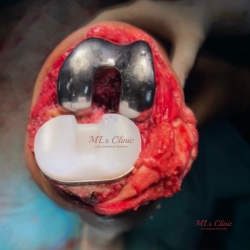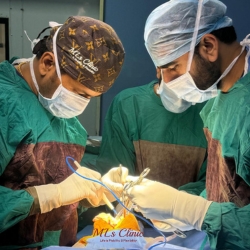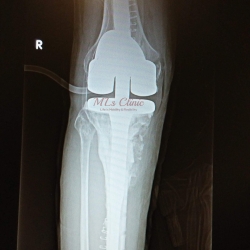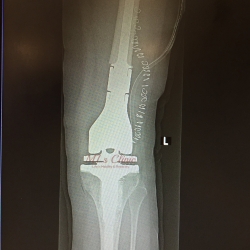13 Common Orthopedic Questions and Answers on Joint Pain and Joint Replacement Surgery

Are you dealing with joint pain or wondering about bone health? You’re not alone! Dr. Preetesh Choudhary, a renowned orthopedic surgeon in Indore, here are some orthopedic questions and answers commonly asked.
Some Common Orthopedic Questions & Answers
-
When Should one Consider Joint Replacement Surgery?

If joint pain persists despite rest, physical therapy, or medication, and mobility is severely limited, it may be time to consider joint replacement. Other signs include joint deformity, persistent swelling, and difficulty with everyday activities like walking or climbing stairs.
Quick Tip: Joint replacement is usually a last resort but can greatly improve quality of life when non-surgical treatments no longer help.
2. What Factors Affect the Success Rate of Knee Replacement Surgery?
Knee Replacement Surgeon, Dr. Preetesh Choudhary says, “The success rate of Knee Replacement Surgery depends on the types of knee implants used, the technique employed, and the condition of the bone. Additionally, factors such as diabetes,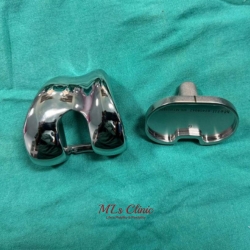 obesity, or a history of cardiac arrest can affect the outcome.”
obesity, or a history of cardiac arrest can affect the outcome.”
Research shows that 90-95% of knee replacement surgeries are successful 10 years after surgery, with most patients able to walk unaided, climb stairs, and resume their favorite activities.
3. How Long Does Knee Replacement Surgery Lasts?
According to the Knee Replacement Surgeon, with proper care and avoiding excessive strain, most knee replacement surgery last 15-20 years.
4. Are There Non-Surgical Treatments for Joint Pain, or Is Surgery the Only Option?
Surgery is often the last option. Many people find relief through non-surgical options like physical therapy, medications, or joint injections for knee and other joints. Joint injections like cortisone injections or PRP therapy can reduce inflammation and provide relief without surgery.
Pro Tip: Always try conservative treatments first. Joint replacement Surgery isn’t the only option available.
5. What’s the Best Way to Prevent Knee Pain?
Building strength in the muscles around your knee and keeping it flexible are essential for prevention. Exercises like squats and lunges help support the knee joint.
Fact: Cycling and swimming are great low-impact activities that keep your knees healthy without added strain and keep you away from knee pain!
6. What Does a Bone Density Test Tell About Bone Health?
A bone density test measures how strong your bones are and is essential for diagnosing conditions like osteoporosis. It helps identify bone weakness before fractures occur.
Pro Tip: Weight-bearing exercises, such as walking or hiking, can help improve bone density.
7. Can Arthritis Be Cured?
Arthritis, especially osteoarthritis, tends to worsen over time but can be managed. While there is no cure, joint pain treatments such as medications, joint injections, and joint replacement surgery can effectively manage symptoms.
Pro Tip: Staying active and exercising regularly can help reduce joint pain and stiffness and related to arthritis.
8. Can stress and poor sleep make bone and joint pain worse?
Chronic stress can cause muscle tension, inflammation, and weakened bones, increasing the risk of osteoporosis and worsening joint pain. Poor sleep prevents your body from repairing itself, leading to increased stiffness, especially in conditions like arthritis.
worsening joint pain. Poor sleep prevents your body from repairing itself, leading to increased stiffness, especially in conditions like arthritis.
Dr. Preetesh Choudhary’s Tip: Manage stress with relaxation techniques like meditation, and use a firm mattress with a supportive pillow to improve sleep quality.
9. How Long Can Artificial Joints Usually Last?
Advances in medical technology and improved prosthetic materials have significantly extended the lifespan of artificial joints. Today, most prosthetic joints—whether hip, knee, or shoulder—can last between 15 to 20 years. Factors like activity level, weight, and overall health can impact the durability of artificial joints.
Pro Tip: Maintaining a healthy weight and staying active can help extend the life of your artificial joint.
10. When Is Revision Surgery Necessary?
Revision surgery is needed when a previously placed joint prosthetic becomes damaged or wears out. If your joint prosthetic needs to be replaced, revision surgery restores function. A skilled Knee replacement surgeon evaluates whether revision surgery is the right step.
Treatment Tip: Revision surgery is considered when conservative treatments fail, or the joint prosthetic needs replacement.
11. Can Dehydration Impact Joint Health?
Yes, dehydration reduces lubrication in the joints, leading to joint stiffness and discomfort. It can also worsen conditions like osteoarthritis. Staying hydrated helps keep cartilage lubricated for smooth, pain-free movement.
12. Why Are Hinge and Stem Implants Used, and Are They Costly?
Hinge implants restore joint movement in complex cases like severe deformities or revision surgeries, while stem implants secure the prosthetic to the bone for stability. These knee implants provide long-term function and stability but are more expensive due to their advanced design.
13. Do hinge implants or stem cell therapy really work for joint pain?
- Hinge Implants: Used in complex knee and hip replacements, especially in severe deformities or revision surgeries. They restore movement and stability but can be more expensive due to their advanced design.
- Stem Cell Therapy: A non-surgical option that uses your own stem cells to heal tissue and reduce joint pain, often for arthritis or sports injuries. It’s less invasive than surgery but might not work for everyone.
Orthopedic surgeon, Dr. Preetesh Choudhary says, “Both are effective, but the right choice depends on your specific needs!”
Wrapping Up
Orthopedic health doesn’t have to be confusing! Understanding common orthopedic questions and answers can help you make informed decisions about your care. If you have concerns or need advice from orthopedic surgeon, schedule a consultation with Knee replacement surgeon and hip replacement surgeon in Indore, Dr. Preetesh Choudhary at MLS Clinic. Take charge of your health today and don’t let joint pain or bone conditions hold you back from living life to the fullest!
